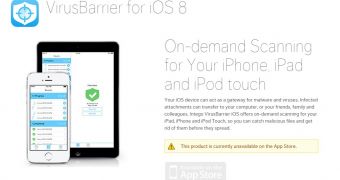Some apps advertising to offer various degrees of anti-malware protection for iPhone and iPad products have been pulled from Apple’s official iOS repository with no prior warning from the company.
Intego’s VirusBarrier for iOS is one of the products affected by Apple’s decision. The app’s functionality consisted in scanning data coming from cloud storage or from email attachments and alerting the user if malicious code was detected.
Product booted from App Store for inaccurate description
The company, which develops security software for iOS and OS X, says that clients who still have the now banned VirusBarrier installed on their device will continue to receive updates for virus definitions because this process is independent from the App Store.
However, new versions of the product can no longer be delivered, as they are provided through Apple’s servers.
“Our VirusBarrier for Mac customers are unaffected by this action. VirusBarrier for Mac still scans for viruses on iOS devices and finds and eradicates viruses found in document directories on the devices,” says Jeff Erwin, Intego CEO.
He also explains in a blog post that this move from Apple was not intended for Intego’s products only and impacts other companies, too.
When VirusBarrier was expunged from the store, Erwin received a notification from Apple disclosing the reason of the action. It appears that the app had a misleading description that could make one think that there were viruses on iOS, MacRumors reports.
To keep the app available to iOS customers, Intego modified the description so that it reflected the functionality of the product in the most clear way possible, stating that VirusBarrier scanned cloud files and email attachments.
Malware for iOS is real, but efficient protection is yet to roll out
Maintaining the facade that malware does not exist for iOS is dangerous for both the company and its customers.
Multiple security companies have identified threats for Apple’s mobile platform that affect not only jailbroken devices but also those functioning with the intended security checks; and there are records of nefarious pieces making it to the App Store as well.
A post in mid-2014 from Fortinet revealed a small batch of threats discovered for iOS since 2009. A report earlier this month from mobile security company Lookout confirms the fact that the platform has become more appealing not just for cybercriminals but also for cyber-espionage groups.
On the other hand, anti-malware products, for both iOS and Android, are not as efficient as their desktop counterparts. In most cases, they can only point in the direction of the threat but cannot actually remove it.
For the moment, keeping mobile data safe depends mostly on the user and less on the technology available for protecting the device.

 14 DAY TRIAL //
14 DAY TRIAL //